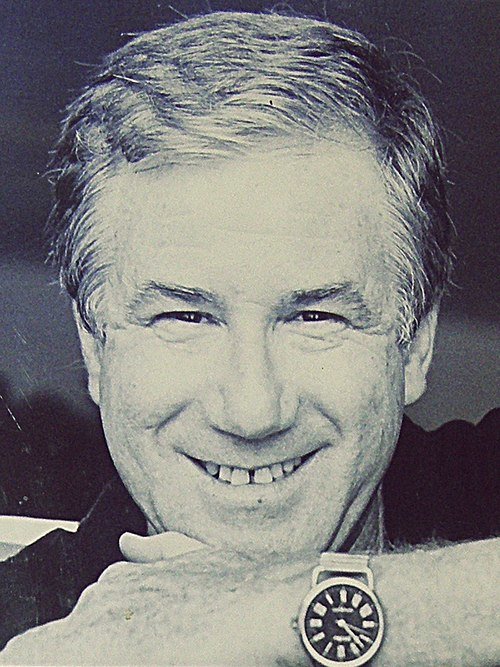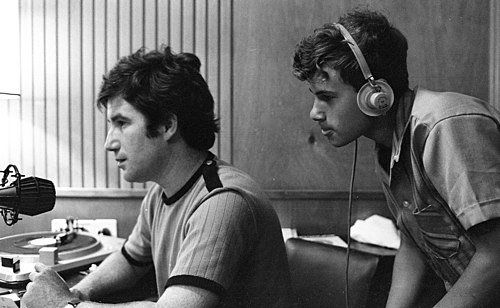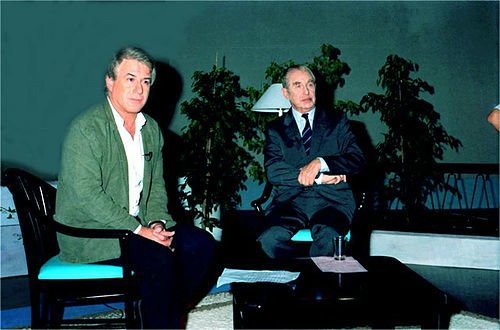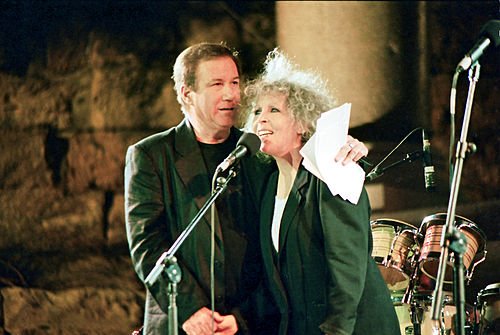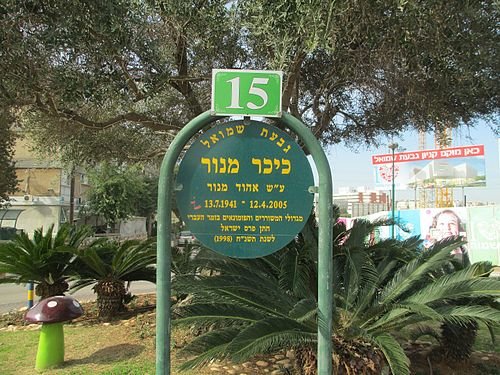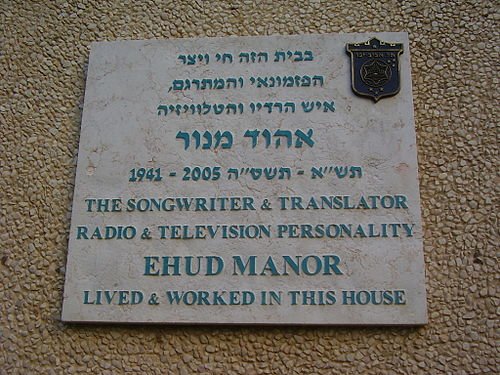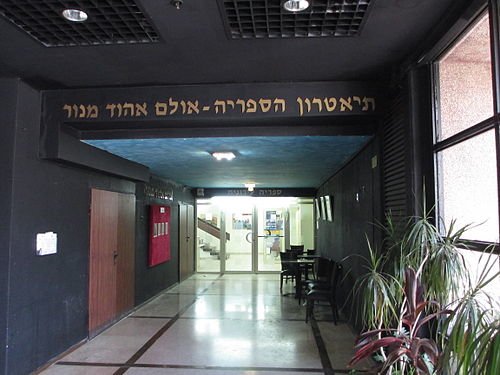מורשת גדולי האומה
בזכותם קיים
beta
Ehud Manor: A Legacy in Israeli Music and Culture
Ehud Manor (July 13, 1941 – April 12, 2005) was a prolific Israeli songwriter, translator, poet, radio broadcaster, and television host. He was awarded the prestigious Israel Prize in the field of Hebrew songwriting in 1998. Known for his immense contributions to Israeli music, he also made significant contributions to theater through translation and writing.
Born as Ehud Weiner in Binyamina, Israel, to parents Rachel and Yisrael Weiner, both immigrants from Belarus, the Weiner family arrived in Binyamina in 1936 and established a stone construction industry. Manor attended the Haifa Reali School and faced the loss of his father at the tender age of 15. He later served in the Israel Defense Forces as a combat engineer and as a combat intelligence officer. After his military service, he pursued studies in psychology and English literature at the Hebrew University in Jerusalem.
In 1962, he began working as a music editor for Kol Yisrael (Voice of Israel) radio. During this period, he changed his family name to Manor. A year later, he traveled to New York to study mass communication, where he met singer Ofra Haza, daughter of actor Yehuda Haza. After some time, they married and returned to Israel, eventually having three children named Gali, Libi, and Yehuda, the latter named after Ehud's late brother.
In the summer of 1968, during the Six-Day War, Ehud's younger brother, Yehuda Weiner, tragically lost his life. Overcome by grief, Ehud wrote the song "Achi Hatza'ir Yehuda" (My Young Brother Yehuda), which was recorded in the winter of 1969 by the Sarit Hadad Troupe. He also penned the songs "Ben Yafe Nolad" (A Beautiful Son is Born) and "BaShana HaBa'ah" (Next Year), all of which expressed his deep sorrow for his brother's loss. His grief further manifested in the song "Ein Li Eretz Acheret" (I Have No Other Land).
From the early 1970s until the end of his life, Ehud Manor hosted and produced numerous radio and television programs dedicated to music, culture, and entertainment. He was a sought-after host for events and shows that explored Israeli culture and music. Some of the television programs he hosted on Channel 1 included "HaErev Im..." (The Evening with...), "Mifgash Omanim" (Artist Encounter), "Mashech Gadol-Mashech Katan" (Big Screen-Small Screen), "BeTzeva" (In Color), "Zemeret HaAretz" (Song of the Land), "Ad Pop," "Personal Screen," "Sof Shavua" (Weekend), "HaYeluch Chozar" (The Journey Continues), "Eifo Hayinu" (Where Were We?), and more. In addition to his broadcasting career, Manor authored popular songs performed by leading artists of his time and translated plays for the theater.
In 1981, he completed a second degree in English literature at the University of Cambridge. During his studies, he worked as a correspondent for Maariv in the UK.
In 1995, Ehud Manor was awarded the ACUM Prize for his lifetime achievements in songwriting, and in 1998, during Israel's Jubilee year, he received the Israel Prize in the field of Hebrew songwriting. In March 2005, he was awarded an honorary doctorate from Bar-Ilan University in recognition of his significant contribution to Hebrew culture. His final song, "Ani She'ayach" (I Belong), became the anthem for the university's jubilee year.
Tragedy struck again in May 2003 when his eldest brother, Zeev Nir, passed away at the age of 67 due to economic difficulties.
Ehud Manor, a heavy smoker, battled lung cancer, from which he briefly recovered before succumbing to heart failure on April 12, 2005. His funeral in Binyamina was attended by numerous public figures, artists, and performers, who paid tribute by performing his songs, including "Ein Li Eretz Acheret" (I Have No Other Land) by Gali Atari, "Misho" (Someone) by Matti Caspi, and "Yamim Binyamina" (Days in Binyamina) by Hanan Yovel. Manor is survived by his wife, three children, and grandchildren.
After his passing, the Ministry of Education decided to include his songs in the curriculum of Israeli schools.
Ehud Manor wrote lyrics for over a thousand songs throughout his career. His first significant collaboration was with composer Nurit Hirsch, resulting in songs like "HaBatei Shenigmaru Leid HaYam" (The Houses by the Seashore). Other hits followed, such as "BaShana HaBa'ah" (Next Year) and "Lelechet Shevi Achareicha" (I'll Follow You). In the mid-1970s, Manor began working with singer-songwriter Matti Caspi, crafting complex ballads like "Brit Olam" (Eternal Covenant), "Yaladuti HaShniya" (My Second Childhood), and "Lo Yadaati SheTilchi Mimeni" (I Didn't Know You'd Leave).
Manor often described his collaboration with Caspi as a "mutual completion of each other." In 1982, the duo presented the highly successful show "Yamim Binyamina" (Days in Binyamina), dedicated to Manor's songs, marking the beginning of a fruitful partnership with Hanan Yovel. In 1983, they created the show "Adelaide Carnival '83."
In 1985, Yovel recorded the album "Dor" (Generation), which included songs written by Manor and composed by Yovel. The album produced hits like "Ve'im HaShir HaZeh Nishma Lachem Mokher" (And If This Song Is Heard By You Tomorrow), "Dor" (Generation), and "Yam Tikhoni" (Mediterranean Sea). In the same year, Manor's album "BeEmtza HaChayim" (In the Middle of Life) was released, featuring songs like "Emtza HaChayim" (In the Middle of Life) and "Acheret Lo Hayiti Shar" (I Wouldn't Be Different).
Throughout the 1980s and 1990s, Manor collaborated with the renowned singer Boaz Sharabi, and together they released several hits, including "HaLevavi" (My Heart), "Mash'ala" (Wish), "Kshe'At Nog'at Bi" (When You Touch Me), and "Lish'or Itach" (To Sing with You), which he wrote as a tribute to the singer Shoshana Damari, whom he admired since childhood. The song was performed as a duet by Sharabi and Manor.
Starting in the 1990s, Manor also collaborated with the popular singer Ofra Haza. Their joint efforts produced hits like "Halav" (Milk), "Mash'ala" (Wish), "Kshe'At Nog'at Bi" (When You Touch Me), and "Lish'or Itach" (To Sing with You).
Manor's musical partnership extended to many other famous Israeli artists, including Ilanit, Ariel Zilber, Yardenah Arazi, Rivka Zohar, Chava Alberstein, Zvika Pick, Ricky Gal, Ofer Hazza, Maya Buskila, and Sarit Hadad.
Even after his passing, Manor's songs continued to inspire new generations of artists. In 2011, the composer Karni Postal set Manor's song "Machar Yagi'a BeChatzot" (Tomorrow Midnight) to music and performed it as a duet with singer Amir Dadon during the Memorial Torch-Lighting Ceremony on Mount Herzl on Israel's Independence Day. In 2020, Rami Kleinstein composed the song "Eretz Moledet Eretz Bo'eret" (Homeland, Burning Land) with lyrics by Manor, which was performed by Tal Sandak as part of his album "Shiratam."
In July 2021, Ehud Manor's song "Shir Gil" (Gil's Song) was released as a duet by Ilanit and Tal Sandak, with music by Kobi Oshrat. The song was released in celebration of Ehud Manor's 80th birthday.
Ehud Manor wrote numerous songs for various song competitions. In the 1969 Israel Song Festival, his songs "BaDerech Hazara" (On the Way Back) and "Shir BeArba'ah Batim" (A Song in Four Houses) were performed by Avi Toledano and Ilanit, respectively. In the 1972 Israel Song Festival, Manor's song "Tov Li Lashir" (I Like to Sing) won with the group The Tov HaRa trio, with music by Shmulik Kraus and arrangements by Alex Weiss.
For Israel's debut at the Eurovision Song Contest in 1973, Manor wrote the song "Ei Sham" (Somewhere), which secured a fourth-place finish. His song "Amor Shalom" (Say Hello) represented Israel at the Eurovision Song Contest in 1976, performed by the Chocolate, Menta, Mastik trio, and in 1978, Manor penned the song "Abanibi," which won first place in the competition, held in Paris, and was performed by Izhar Cohen. The lyrics of this song, notably, contained the phrase "Am Yisrael Chai" (The Nation of Israel Lives).
Other songs written by Manor that represented Israel in the Eurovision Song Contest include "At VeAni" (You and I) by Shlomo Artzi in 1975, "Ben Adam" (Son of Man) by Yardena Arazi in 1988, and "Zeh Rak Sport" (It's Just Sports) by Dafna Dekel in 1992.
Manor also penned many children's songs for various children's song festivals and events. Some of his most famous children's songs include "Gali" (My Wave) performed by Rivka Zohar and Noam Kaniel, "Achoti HaKtana" (My Little Sister) known as "Kor'im Laha Libi" (They Call Her Libi) sung by Yaffa Yarkoni, and "Ben" (Son) about his own son Yehuda.
His children's songs often conveyed life lessons, such as "Mi Ohav Et HaShabbat?" (Who Loves the Sabbath?), "Yeladim Tovim, Yeladim Ra'im" (Good Children, Bad Children), "Mi Ra'ah Et Bani?" (Who Saw My Son?), and "Shalom He Milah SheYimushit" (Shalom is a Useful Word).
Ehud Manor's legacy lives on through his timeless songs that continue to captivate audiences, inspire artists, and celebrate the rich cultural tapestry of Israel. His music and lyrics are cherished not only in Israel but also around the world, leaving an indelible mark on the nation's cultural heritage.
In 1962, he began working as a music editor for Kol Yisrael (Voice of Israel) radio. During this period, he changed his family name to Manor. A year later, he traveled to New York to study mass communication, where he met singer Ofra Haza, daughter of actor Yehuda Haza. After some time, they married and returned to Israel, eventually having three children named Gali, Libi, and Yehuda, the latter named after Ehud's late brother.
In the summer of 1968, during the Six-Day War, Ehud's younger brother, Yehuda Weiner, tragically lost his life. Overcome by grief, Ehud wrote the song "Achi Hatza'ir Yehuda" (My Young Brother Yehuda), which was recorded in the winter of 1969 by the Sarit Hadad Troupe. He also penned the songs "Ben Yafe Nolad" (A Beautiful Son is Born) and "BaShana HaBa'ah" (Next Year), all of which expressed his deep sorrow for his brother's loss. His grief further manifested in the song "Ein Li Eretz Acheret" (I Have No Other Land).
From the early 1970s until the end of his life, Ehud Manor hosted and produced numerous radio and television programs dedicated to music, culture, and entertainment. He was a sought-after host for events and shows that explored Israeli culture and music. Some of the television programs he hosted on Channel 1 included "HaErev Im..." (The Evening with...), "Mifgash Omanim" (Artist Encounter), "Mashech Gadol-Mashech Katan" (Big Screen-Small Screen), "BeTzeva" (In Color), "Zemeret HaAretz" (Song of the Land), "Ad Pop," "Personal Screen," "Sof Shavua" (Weekend), "HaYeluch Chozar" (The Journey Continues), "Eifo Hayinu" (Where Were We?), and more. In addition to his broadcasting career, Manor authored popular songs performed by leading artists of his time and translated plays for the theater.
In 1981, he completed a second degree in English literature at the University of Cambridge. During his studies, he worked as a correspondent for Maariv in the UK.
In 1995, Ehud Manor was awarded the ACUM Prize for his lifetime achievements in songwriting, and in 1998, during Israel's Jubilee year, he received the Israel Prize in the field of Hebrew songwriting. In March 2005, he was awarded an honorary doctorate from Bar-Ilan University in recognition of his significant contribution to Hebrew culture. His final song, "Ani She'ayach" (I Belong), became the anthem for the university's jubilee year.
Tragedy struck again in May 2003 when his eldest brother, Zeev Nir, passed away at the age of 67 due to economic difficulties.
Ehud Manor, a heavy smoker, battled lung cancer, from which he briefly recovered before succumbing to heart failure on April 12, 2005. His funeral in Binyamina was attended by numerous public figures, artists, and performers, who paid tribute by performing his songs, including "Ein Li Eretz Acheret" (I Have No Other Land) by Gali Atari, "Misho" (Someone) by Matti Caspi, and "Yamim Binyamina" (Days in Binyamina) by Hanan Yovel. Manor is survived by his wife, three children, and grandchildren.
After his passing, the Ministry of Education decided to include his songs in the curriculum of Israeli schools.
Musical Collaborations
Ehud Manor wrote lyrics for over a thousand songs throughout his career. His first significant collaboration was with composer Nurit Hirsch, resulting in songs like "HaBatei Shenigmaru Leid HaYam" (The Houses by the Seashore). Other hits followed, such as "BaShana HaBa'ah" (Next Year) and "Lelechet Shevi Achareicha" (I'll Follow You). In the mid-1970s, Manor began working with singer-songwriter Matti Caspi, crafting complex ballads like "Brit Olam" (Eternal Covenant), "Yaladuti HaShniya" (My Second Childhood), and "Lo Yadaati SheTilchi Mimeni" (I Didn't Know You'd Leave).
Manor often described his collaboration with Caspi as a "mutual completion of each other." In 1982, the duo presented the highly successful show "Yamim Binyamina" (Days in Binyamina), dedicated to Manor's songs, marking the beginning of a fruitful partnership with Hanan Yovel. In 1983, they created the show "Adelaide Carnival '83."
In 1985, Yovel recorded the album "Dor" (Generation), which included songs written by Manor and composed by Yovel. The album produced hits like "Ve'im HaShir HaZeh Nishma Lachem Mokher" (And If This Song Is Heard By You Tomorrow), "Dor" (Generation), and "Yam Tikhoni" (Mediterranean Sea). In the same year, Manor's album "BeEmtza HaChayim" (In the Middle of Life) was released, featuring songs like "Emtza HaChayim" (In the Middle of Life) and "Acheret Lo Hayiti Shar" (I Wouldn't Be Different).
Throughout the 1980s and 1990s, Manor collaborated with the renowned singer Boaz Sharabi, and together they released several hits, including "HaLevavi" (My Heart), "Mash'ala" (Wish), "Kshe'At Nog'at Bi" (When You Touch Me), and "Lish'or Itach" (To Sing with You), which he wrote as a tribute to the singer Shoshana Damari, whom he admired since childhood. The song was performed as a duet by Sharabi and Manor.
Starting in the 1990s, Manor also collaborated with the popular singer Ofra Haza. Their joint efforts produced hits like "Halav" (Milk), "Mash'ala" (Wish), "Kshe'At Nog'at Bi" (When You Touch Me), and "Lish'or Itach" (To Sing with You).
Manor's musical partnership extended to many other famous Israeli artists, including Ilanit, Ariel Zilber, Yardenah Arazi, Rivka Zohar, Chava Alberstein, Zvika Pick, Ricky Gal, Ofer Hazza, Maya Buskila, and Sarit Hadad.
Even after his passing, Manor's songs continued to inspire new generations of artists. In 2011, the composer Karni Postal set Manor's song "Machar Yagi'a BeChatzot" (Tomorrow Midnight) to music and performed it as a duet with singer Amir Dadon during the Memorial Torch-Lighting Ceremony on Mount Herzl on Israel's Independence Day. In 2020, Rami Kleinstein composed the song "Eretz Moledet Eretz Bo'eret" (Homeland, Burning Land) with lyrics by Manor, which was performed by Tal Sandak as part of his album "Shiratam."
In July 2021, Ehud Manor's song "Shir Gil" (Gil's Song) was released as a duet by Ilanit and Tal Sandak, with music by Kobi Oshrat. The song was released in celebration of Ehud Manor's 80th birthday.
Ehud Manor's Songs in Song Contests
Ehud Manor wrote numerous songs for various song competitions. In the 1969 Israel Song Festival, his songs "BaDerech Hazara" (On the Way Back) and "Shir BeArba'ah Batim" (A Song in Four Houses) were performed by Avi Toledano and Ilanit, respectively. In the 1972 Israel Song Festival, Manor's song "Tov Li Lashir" (I Like to Sing) won with the group The Tov HaRa trio, with music by Shmulik Kraus and arrangements by Alex Weiss.
For Israel's debut at the Eurovision Song Contest in 1973, Manor wrote the song "Ei Sham" (Somewhere), which secured a fourth-place finish. His song "Amor Shalom" (Say Hello) represented Israel at the Eurovision Song Contest in 1976, performed by the Chocolate, Menta, Mastik trio, and in 1978, Manor penned the song "Abanibi," which won first place in the competition, held in Paris, and was performed by Izhar Cohen. The lyrics of this song, notably, contained the phrase "Am Yisrael Chai" (The Nation of Israel Lives).
Other songs written by Manor that represented Israel in the Eurovision Song Contest include "At VeAni" (You and I) by Shlomo Artzi in 1975, "Ben Adam" (Son of Man) by Yardena Arazi in 1988, and "Zeh Rak Sport" (It's Just Sports) by Dafna Dekel in 1992.
Manor also penned many children's songs for various children's song festivals and events. Some of his most famous children's songs include "Gali" (My Wave) performed by Rivka Zohar and Noam Kaniel, "Achoti HaKtana" (My Little Sister) known as "Kor'im Laha Libi" (They Call Her Libi) sung by Yaffa Yarkoni, and "Ben" (Son) about his own son Yehuda.
His children's songs often conveyed life lessons, such as "Mi Ohav Et HaShabbat?" (Who Loves the Sabbath?), "Yeladim Tovim, Yeladim Ra'im" (Good Children, Bad Children), "Mi Ra'ah Et Bani?" (Who Saw My Son?), and "Shalom He Milah SheYimushit" (Shalom is a Useful Word).
Ehud Manor's legacy lives on through his timeless songs that continue to captivate audiences, inspire artists, and celebrate the rich cultural tapestry of Israel. His music and lyrics are cherished not only in Israel but also around the world, leaving an indelible mark on the nation's cultural heritage.
- אהוד מנורhe.wikipedia.org
